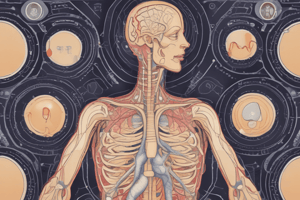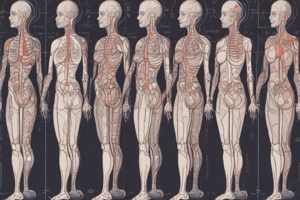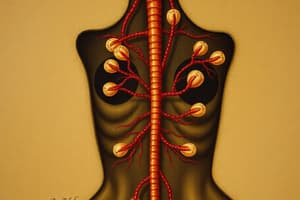Podcast
Questions and Answers
Which gland is primarily known as the 'master gland' and regulates other glands in the endocrine system?
Which gland is primarily known as the 'master gland' and regulates other glands in the endocrine system?
- Pancreas
- Adrenal Glands
- Thyroid Gland
- Pituitary Gland (correct)
Which of the following exocrine glands is responsible for producing digestive enzymes?
Which of the following exocrine glands is responsible for producing digestive enzymes?
- Mammary Glands
- Pancreatic Exocrine Tissue (correct)
- Sebaceous Glands
- Salivary Glands
Which type of hormone is derived from cholesterol and includes cortisol?
Which type of hormone is derived from cholesterol and includes cortisol?
- Protein Hormones
- Peptide Hormones
- Steroid Hormones (correct)
- Amine Hormones
What type of feedback mechanism is used when high blood sugar levels induce the release of insulin to lower blood sugar?
What type of feedback mechanism is used when high blood sugar levels induce the release of insulin to lower blood sugar?
Which endocrine gland is responsible for regulating metabolism, growth, and development?
Which endocrine gland is responsible for regulating metabolism, growth, and development?
Which statement accurately describes the difference between exocrine and endocrine glands?
Which statement accurately describes the difference between exocrine and endocrine glands?
What is the primary role of hormones produced by endocrine glands?
What is the primary role of hormones produced by endocrine glands?
Which of the following factors can influence the secretion of hormones from endocrine glands?
Which of the following factors can influence the secretion of hormones from endocrine glands?
How do exocrine glands differ in function from endocrine glands concerning hormone regulation?
How do exocrine glands differ in function from endocrine glands concerning hormone regulation?
Which of the following statements about hormone action is true?
Which of the following statements about hormone action is true?
Flashcards are hidden until you start studying
Study Notes
Human Glands
Endocrine System
- Composed of glands that release hormones directly into the bloodstream.
- Major glands include:
- Pituitary Gland: "Master gland," regulates other glands; located at the base of the brain.
- Thyroid Gland: Regulates metabolism, growth, and development; located in the neck.
- Adrenal Glands: Produce hormones like cortisol and adrenaline; located on top of each kidney.
- Pancreas: Functions as both an endocrine and exocrine gland; regulates blood sugar levels by producing insulin and glucagon.
- Gonads (Ovaries and Testes): Produce sex hormones; involved in reproduction.
- Hormones target specific organs or tissues, affecting various bodily functions.
Exocrine Glands
- Release substances through ducts to external surfaces or cavities, rather than into the bloodstream.
- Major exocrine glands include:
- Salivary Glands: Produce saliva for digestion.
- Sweat Glands: Help regulate body temperature and eliminate waste.
- Sebaceous Glands: Produce oil (sebum) for skin lubrication.
- Mammary Glands: Produce milk in females for feeding infants.
- Pancreatic Exocrine Tissue: Releases digestive enzymes into the small intestine.
Hormone Regulation
- Hormone levels are regulated through feedback mechanisms:
- Negative Feedback: The output reduces the initial stimulus (e.g., high blood sugar induces insulin release, which lowers blood sugar).
- Positive Feedback: The output enhances the initial stimulus (e.g., oxytocin during childbirth).
- Hormones can be categorized by:
- Peptide Hormones: Chains of amino acids (e.g., insulin).
- Steroid Hormones: Derived from cholesterol (e.g., cortisol).
- Amine Hormones: Derived from single amino acids (e.g., adrenaline).
- Regulation involves complex interactions among various hormones and biological signals to maintain homeostasis.
Endocrine System
- The endocrine system is composed of glands that release hormones directly into the bloodstream.
- Major glands include the pituitary gland, thyroid gland, adrenal glands, pancreas, and gonads (ovaries and testes).
- The pituitary gland, located at the base of the brain, is often called the "master gland" because it regulates the function of other glands.
- The thyroid gland, located in the neck, regulates metabolism, growth, and development.
- The adrenal glands, located on top of each kidney, produce hormones like cortisol and adrenaline.
- The pancreas functions as both an endocrine and exocrine gland; it regulates blood sugar levels by producing insulin and glucagon.
- The gonads produce sex hormones and are involved in reproduction.
Exocrine Glands
- Exocrine glands release substances through ducts to external surfaces or cavities, rather than into the bloodstream.
- Major exocrine glands include salivary glands, sweat glands, sebaceous glands, mammary glands, and pancreatic exocrine tissue.
- Salivary glands produce saliva for digestion.
- Sweat glands help regulate body temperature and eliminate waste.
- Sebaceous glands produce oil (sebum) for skin lubrication.
- Mammary glands produce milk in females for feeding infants.
- Pancreatic exocrine tissue releases digestive enzymes into the small intestine.
Hormone Regulation
- Hormone levels are regulated through feedback mechanisms, primarily negative feedback and positive feedback.
- Negative feedback occurs when the output of a hormone reduces the initial stimulus, like high blood sugar inducing insulin release, which lowers blood sugar.
- Positive feedback occurs when the output of a hormone enhances the initial stimulus, like oxytocin release during childbirth, which amplifies labor contractions.
- Hormones are categorized into three classes: peptide hormones, steroid hormones, and amine hormones.
- Peptide hormones are chains of amino acids, like insulin.
- Steroid hormones are derived from cholesterol, like cortisol.
- Amine hormones are derived from single amino acids, like adrenaline.
- Regulation involves complex interactions among various hormones and biological signals to maintain homeostasis.
Endocrine System: The Master Gland
- Pituitary gland: Often referred to as the "master gland" due to its role in regulating other endocrine glands.
Exocrine Glands and Digestion
- Pancreas: A key exocrine gland that produces digestive enzymes aiding in food breakdown.
Steroid Hormones
- Steroid hormones: Derived from cholesterol, a prominent example being cortisol which plays a vital role in stress response.
Feedback Mechanisms in Hormone Regulation
- Negative feedback: A common regulatory mechanism in the endocrine system. High blood sugar levels stimulate insulin release, which in turn lowers blood sugar, illustrating this principle.
Thyroid Gland: Regulation of Metabolism and Growth
- Thyroid gland: Produces hormones that regulate metabolism, growth, and development.
Exocrine vs. Endocrine: Distinguishing Gland Types
- Exocrine glands: Release their secretions through ducts, often directly onto target tissues. Think of sweat glands or salivary glands.
- Endocrine glands: Release hormones directly into the bloodstream, where they travel to target tissues for action.
Hormonal Role in the Body
- Hormones: Chemical messengers produced by endocrine glands, influencing various bodily functions.
Factors Influencing Hormone Secretion
- Several factors can influence hormone secretion from endocrine glands, including:
- Hormonal stimulation: One hormone triggering the release of another.
- Neural stimulation: Nerves triggering hormone release.
- Chemical changes in the blood: Fluctuations in blood glucose or calcium levels stimulating hormonal responses.
Distinctive Functions of Exocrine and Endocrine Glands
- Exocrine glands: Do not directly participate in hormone regulation.
- Endocrine glands: Specialized to produce and release hormones into the bloodstream.
Hormone Action: A Key Principle
- Receptor-mediated action: Hormones typically exert their effects by binding to specific receptors on target cells, triggering intracellular changes.
Studying That Suits You
Use AI to generate personalized quizzes and flashcards to suit your learning preferences.




